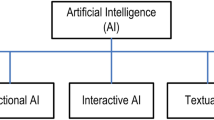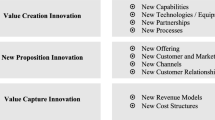Abstract
Agent-based models informed by empirical data are growing in popularity. Many models make extensive use of collected data for the development, initialisation or validation. In parallel, models are growing in size and complexity, generating large amounts of output data. On the other hand, Data Mining is used to extract hidden patterns from large collections of data using different techniques. This work proposes the intense use of Data Mining techniques for the improvement and development of agent-based models. It presents a methodological approach explaining why and when to use Data Mining, with a formal description of each stage of the corresponding process. This is illustrated with a case study, showing the application of the proposed approach step by step.
Similar content being viewed by others
References
Ahmad MA, Teredesai A (2006) Modeling spread of ideas in online social networks. In: Proceedings of the fifth Australasian conference on data mining and analystics, vol 61. Australian Computer Society, Inc, Sydney, pp 185–190
Balci O (2004) Quality assessment, verification, and validation of modeling and simulation applications. In: WSC ’04: proceedings of the 36th conference on winter simulation, pp 122–129. Winter simulation conference
Boero R, Squazzoni F (2005). Does empirical embeddedness matter? Methodological issues on agent-based models for analytical social science. J Artif Soc Soc Simul 8(4):6
Botía JA, Hernansaez JM, Gómez-Skarmeta AF (2004) Towards an approach for debugging mas through the analysis of acl messages. In: Multiagent system technologies, second German conference, MATES 2004. Lecture notes in computer science, vol 3187. Springer, Berlin, pp 301–312
Collier N (2001) Repast: an extensible framework for agent simulation. In: Swarmfest 2000: proceedings of the 4th annual swarm user group meeting, March 11–13, 2000. Utah State University, Logan, Utah, p 17
Dean JS, Gumerman GJ, Epstein JM, Axtell RL, Swedlund AC, Parker MT, McCarroll S (2000) Understanding anasazi culture change through agent-based modeling. In: Dynamics in human and primate societies: agent-based modeling of social and spatial processes. Oxford University Press, London, pp 179–205
Deffuant G, Huet S, Bousset JP, Henriot J, Amon G, Weisbuch G (2002) Agent based simulation of organic farming conversion in allier departement. Complex Ecosyst Manag, pp 158–189
Domingos P, Richardson M (2001) Mining the network value of customers. In: Proceedings of the seventh SIGKDD international conference on knowledge discovery and data mining. ACM, San Francisco, pp 57–66
Edmonds B (2001) The use of models—making MABS actually work. In: Multi-agent-based simulation. Springer, Berlin, pp 15–32
Galán JM, Izquierdo LR, Izquierdo SS, Santos JI, del Olmo R, López-Paredes A, Edmonds B (2009a) Errors and artefacts in agent-based modelling. J Artif Soc Soc Simul 12(1):1
Galán JM, López-Paredes A, del Olmo R (2009b) An agent-based model for domestic water management in valladolid metropolitan area. Water Resour Res 45(5):W05401
Gilbert N (2008) Agent-based models. Thousand Oaks, Sage
Gilbert N, Troitzsch KG (1999) Simulation for the social scientist, 1st edn. Open University Press, Maidenhead
Gostoli U (2008) A cognitively founded model of the social emergence of lexicon. J Artif Soc Soc Simul 11(1):2
Hassan S, Antunes L, Arroyo M (2008) Deepening the demographic mechanisms in a data-driven social simulation of moral values evolution. In: David N, Sichman JS (eds) MABS. Lecture notes in artificial intelligence (from the Lecture notes in computer science), vol 5269. Springer, Estoril, pp 167–182
Hassan S, Antunes L, Pavón J (2009a) A data-driven simulation of social values evolution. In AAMAS 2009 proceedings, Budapest. doi:10.1145/1558109.1558282
Hassan S, Antunes L, Pavón J (2009b) Mentat: a data-driven agent-based simulation of social values evolution. In: MABS 2009 proceedings, Budapest. Springer (Springer LNAI, doi:10.1007/978-3-642-13553-8_12)
Hassan S, Pavón J, Antunes L, Gilbert N (2010) Injecting data into agent-based simulation. In: Takadama, K, Deffuant, G, and Cioffi-Revilla, C (eds) The second world congress on social simulation (tentative), Springer Series on Agent Based Social Systems. Springer, Washington. doi:10.1007/978-4-431-99781-8_13
Heath B, Hill R, Ciarallo F (2009) A survey of agent-based modeling practices (January 1998 to July 2008). J Artif Soc Soc Simul 12(4):9
Janssen MA, Ostrom E (2006) Empirically based, agent-based models. Ecol Soc 11(2):37
Kennedy C, Theodoropoulos G, Sorge V, Ferrari E, Lee P, Skelcher C (2007) Aimss: an architecture for data driven simulations in the social sciences. In: ICCS ’07: proceedings of the 7th international conference on computational science, part I. Springer, Berlin, pp 1098–1105
LeBaron B, Arthur WB, Palmer R (1999) Time series properties of an artificial stock market. J Econ Dynam Control 23(9–10):1487–1516
Remondino M, Correndo G (2006) MABS validation through repeated executing and data mining analysis. Int J Simul Syst Sci Technol 7(6):10–21
Richiardi M, Leombruni R, Saam N, Sonnessa M (2006) A common protocol for agent-based social simulation. J Artif Soc Soc Simul 9(1):15
Ripley BD (1987) Stochastic simulation. John Wiley and Sons, New York
Sargent RG (2007) Verification and validation of simulation models. In: WSC ’07: proceedings of the 39th conference on winter simulation. IEEE Press, New York, pp 124–137
Sen S, Sekaran M (1996) Multiagent coordination with learning classifier systems. Springer, Berlin, pp 218–233
Steinley D, Brusco M (2008) Selection of variables in cluster analysis: an empirical comparison of eight procedures. Psychometrika 73:125–144
Witten IH, Frank E (2005) Data mining: practical machine learning tools and techniques, 2nd edn. Elsevier, Amsterdam
Yang L, Gilbert N (2008) Getting away from numbers: using qualitative observation for agent-based modeling. Adv Complex Syst 11(2):175–186
Author information
Authors and Affiliations
Corresponding author
Rights and permissions
About this article
Cite this article
Arroyo, J., Hassan, S., Gutiérrez, C. et al. Re-thinking simulation: a methodological approach for the application of data mining in agent-based modelling. Comput Math Organ Theory 16, 416–435 (2010). https://doi.org/10.1007/s10588-010-9078-y
Published:
Issue Date:
DOI: https://doi.org/10.1007/s10588-010-9078-y




